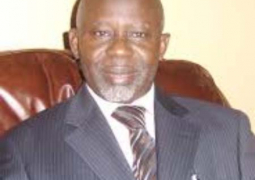Sheikh Zayed Regional Eye care Centre on 13 October 2011 launched the post-health for peace project (HFPI) for the
The launching also coincided with the commemoration of the World Sight Day, which is also celebrated annually worldwide.
According to officials of the centre, the post-HFPI project is a five-year eye project running from January 2009 to Dec 2013.
It is being funded by Sightsavers and the European Commission and implemented in 15 districts in The Gambia,
The project is also partnering with the ministries of health of the three intervention countries and Helen Keller International.
Officials also said the project would increase in visibility and publicity in The Gambia.
Opening of new complex at the centre
Speaking at the event which also witnessed the inauguration of a new complex at the centre, Hon. Fatim Badjie Minister of Health and Social Welfare said the event is another achievement in their efforts at fighting diseases as well as foster peace in the sub-region.
“This achievement, which we the health for peace initiative member countries and our partners are indeed delighted to have, is completion of the construction of the students’ hostel, staff accommodation and the private ward - again an edifice of the collaboration between the governments of the sub-region, Sightsavers, and the Sheikh Zayed Foundation and European Commission,” she said.
She revealed that the new complex would house 30 students and relieve the students from the strain of long travel to receive lectures.
“The staff quarters within the hospital will certainly reduce the cost of call duties in addition to proper accommodation facilities for the staff,” he said.
This centre, Minister Badjie explained, is one of the five components of the health for peace initiatives prevention of blindness programme (HFPI-PBL), indicative of the successes made by the HFPI-PBL since its inception in 2001.
The prevention of blindness component was added to the HFPI following the signing of the “
The same declaration gave the task of coordinating the prevention of blindness components to the ministry of health of The Gambia because of the tremendous achievements of the Gambia National Eye Care Programme, which is recognised as a leading eye care provider in the developing world.
Speaking further, Dr Elizabeth Elhassan, Regional Director Sightsavers in the West African Region, recalled that The Gambia, Guinea Bissau, Senegal and Guinea Conakry considering the fact that peace and security are essential for the preservation and promotion of the health and also taking into consideration the traditional ties of friendship, fraternity, good neighborliness that unite their countries, decided to reinforce concerted effort towards their common health problems.
She said health ministers indentified four areas for action within the Health for Peace Initiative with each area to be coordinated by a member country.
According to her, Guinea Bissau coordinated the Expanded Programme of Immunization while epidemiological surveillance, epidemic management and complex emergencies were for Guinea Conakry.
The
Dilating on the main components and achievements of the HFPI from 2001 to 2006, she said that 112 graduates from 10 countries have passed through the programme including The Gambia, Guinea Bissau, Guinea Conakry; Sierra Leone, Zambia, Benin, Togo, Senegal, and Nigeria.
The graduates included cataract surgeons, diplomats in ophthalmic nursing, community ophthalmic nurses, and two local productions of eye-drop technicians.
“All graduates went home with appropriate equipment to start district eye care services,” she concluded.
For his part, Dr Thomas Sukuwa, WHO country representative, said the history of the health for peace initiative is still fresh in their minds as it were in the late nineties when the world process began.
He said cognizant of the importance of this initiative, the WHO participated and indeed provided technical support to the series of technical meetings held to develop the relevant health protocols and instruments for the effective execution of this initiative.
He says that malaria, HIV/AIDS and blindness prevention are some of their key areas of interventions.
Dr Sukuwa added that strengthening mechanisms for the prevention of avoidable blindness in The Gambia and the sub-region was a particular interest to the WHO.
Meanwhile, at the same ceremony, Sightsavers Regional director also handed over six new motorbikes and operating microscope on behalf of his agency and the EU to Gambian health authorities.


